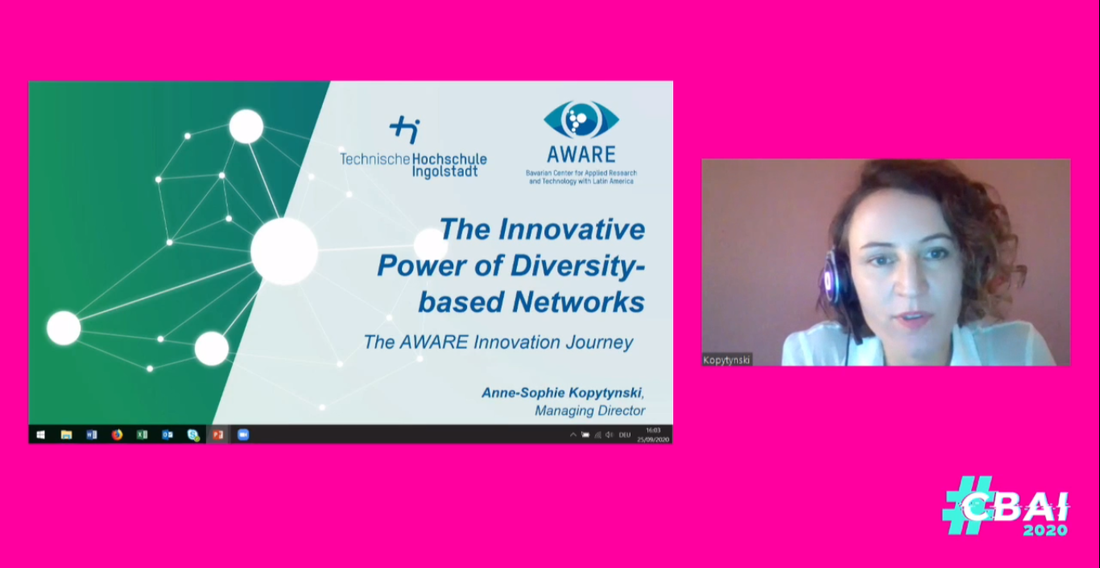Anne-Sophie Kopytynski, Director of the AWARE Centre, emphasises the importance of diverse and multifaceted teams to drive innovation based on university projects.
On the second day of this year's German-Brazilian Innovation Congress, DWIH São Paulo invited Anne-Sophie Kopytynski from the Ingolstadt University of Technology (THI) to participate in the Human Driven Innovation panel discussion, bringing an academic perspective on inclusion and diversity, which she said comes through the formation of interdisciplinary and cross-sectoral teams.
After a brief introduction to the university context, which included the goals of the university - internationalisation of the university and becoming an innovation engine - the head of the AWARE Centre elaborated on the formation of international networks and cooperation with industry. These, she said, were two aspects that together would enable innovative ecosystems both at universities and in industry.
In this context, Kopytynski presented the partnership between THI, Brazilian universities and research institutes as well as automotive companies that have formed the AWARE network (Applied Network on Automotive Research and Education) since 2013. In 2020, the network was expanded and the AWARE Centre (Centre for Research and Technology with Latin America in Bavaria) was launched, providing researchers, professors and students with a robust infrastructure and connecting them with various industry sectors.
As one of the innovative examples, the congress participant presented the spin-off Mobilis, which emerged from the Electromobility Forum organised by AWARE in Joinville in 2013. Founded by Germans and Brazilians, the start-up in the Brazilian state of Santa Catarina focuses on combining small electric vehicles and car-sharing services and, according to Kopytynski, is perhaps one of the most innovative companies in the field of mobility in Santa Catarina today.
The incentive to collaborate with Brazilian institutions and companies is justified by an alternative interpretation of diversity. "Diversity and inclusion in our context mean mixing disciplines, nationalities, different levels of research and study, science and industry," says the German academic. Combining teaching practices and industrial methods, she said, brings a number of challenges, but these are outweighed by the benefits achieved for both sides. "We have opened the doors to put together mixed teams. We are trying to consolidate this policy because if you close one door, you can lose brilliant minds," the AWARE centre director concluded her contribution.
Kopytynski also used her attendance at the congress to offer a tip to industry directors: "Don't focus on quick results; innovation takes time, but it's worth investing that time to make it happen."
Other perspectives
Kopytynski was joined on the panel by Denise Hills, Global Director of Sustainability at Natura, and Adriana Castro, CEO of Ben & Jerry's. Although representing three very different sectors, the three experts showed similar points of view regarding the inseparability of issues such as inclusion and diversity in the development of innovative ideas. The conversation was moderated by the Executive President and CEO of Grupo Bayer Brasil, Marc Reichardt.
Hills presented diversity as part of Natura's strategic planning for the next three decades. There is no other option, he said, considering the heterogeneity of the company's target group. "It is almost inconceivable to offer products and services to such a diverse population without representing that diversity here in the company itself," the director stressed.
The importance of a client feeling represented also shapes the internal phases of creation, which are more diverse the more diverse the origins of the people who make up the team. This is the point of view of Adriana Castro, CEO of Ben & Jerry's, who defends a view that goes beyond technical skills when it comes to recruitment criteria. "The ability to create is much more based on the CV, on the experiences these people have had. New perspectives bring new perspectives," Adriana Castro stressed.
We recall that the Congress was organised by the German-Brazilian Chamber of Commerce São Paulo (AHK São Paulo) in collaboration with DWIH São Paulo.

